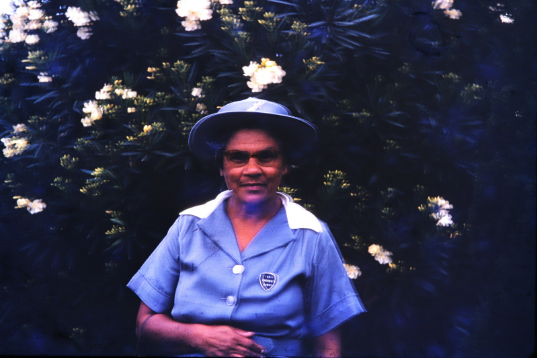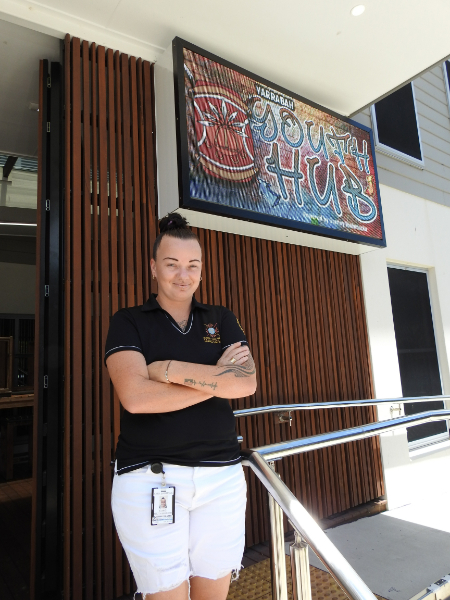2023 International Women's Day
At Gurriny Yealamucka, we value the contribution made to our community the women. Mothers, sisters, aunties, daughters and grand-mothers. Who we are today is a reflection of the work and sacrifice of the women in our community.
International Women's Day 2023 is about #EmbraceEquity, it is also about recognising the #WomenOfYarrabah.

Sister Muriel Stanley, a pioneer and role model for all Indigenous women
For more than a century, women have campaigned for equity, a fair go and for their voice to be heard.
From the early days of the suffragette movement, women throughout the world have raised their individual or collective voices, seeking what can only be described as a basic human right, to be treated and respected as equals, and allowed to live and contribute on a fair and equal basis.
#EmbraceEquity is the theme adopted by International Women’s Day in 2023. This theme is designed to inspire and recognise the tremendous struggle that women today face in their quest for equity in today’s modern society.
Almost 80 years ago the life and daily struggles of an Indigenous woman living in a remote Indigenous community would have been difficult to contemplate.
In the eyes of the Australian government she along with her family, were classified as flora and fauna, it was not until almost 30 years later that Indigenous Australians were counted as citizens of Australia (1967 Referendum).
All Indigenous peoples in Queensland were controlled under the Queensland Aboriginals Preservation and Protection Act (1939), an act which allowed the Director of Native Affairs to control any money or property belonging to an Aboriginal person.
To leave their community they needed to seek permission and exemption for the Director, submitting affirmations and references of their “good character” and their non-association with other Indigenous peoples.
It is against that background of the day, that one Indigenous woman, stood tall and proud, determined to advance herself and her people, facing the prejudices and government regulations of the day, and broke all barriers in a quest for equity and equality.
Muriel Stanley, was born in 1918 in the far north Queensland Indigenous mission of Yarrabah. Although it was situated only a few kilometres across the Trinity inlet from Cairns, at that time, there was not road linking the mission to the outside world, only access was possible by boat. To those in the community they were light years away from ‘modern society’.
The mission controlled their every day life. Local language and custom were forbidden, life could be harsh for community members. Many young members were shipped off as workers to rural properties, with their wages placed in ‘trust’ or paid in forms of rations rather than wages.
Muriel Stanley was educated at the Yarrabah Anglican mission, after completing her education, we went onto work at the mission school as an assistant-teacher.
In 1938, Muriel travelled to Newcastle in New South Wales to attend the training college of the Church Army. A move south from the safety of the mission would have been a daunting affair for Muriel Stanley.
Soon after graduating she worked at the Church Army children's homes in the Hunter Valley and Armidale, leaving to become a matron of an orphanage in Hobart.
Muriel was motivated to help her Aboriginal brothers and sisters at a time where they faced prejudice and injustices, and thus decided to become a nurse.
Initially Muriel struggled to achieve her goal, because of people's prejudices against her skin colour, until she was finally accepted by the South Sydney Women's Hospital in 1943.
After 18 months of study, Muriel passed the final examination in November, 1944, and by March 1945 was a registered obstetric nurse.
Muriel was a forerunner and pioneering role model to an Aboriginal woman seeking to training as nurses and midwives.
Her Head Matron R.M Keable was impressed by Muriel's 'character and determination', declaring it had been a privilege to train her. (Source: Australian Dictionary of Biography)
After completing her studies, Muriel returned back home to Yarrabah, where she was appointed matron of the hospital. On top of her duties there, she also began visiting chronically ill individuals in their homes, and led the St. Mary’s Girls’ Guild.
Muriel was exempted from the Queensland Aboriginals Preservation and Protection Act (1939), an act which allowed the Director of Native Affairs to control any money or property belonging to an Aboriginal person.
Many Aboriginal people sought such exemptions; however, many were denied. In order to apply for an exemption, the person would accompany their request with affirmations from others which confirmed that the individual seeking exemption was “of good character and did not associate with other Aborigines” (Source: State Library of Queensland)
In 1959, Muriel left for England with the Church Army, to undertake a two-year course in moral welfare.
Upon returning to Queensland, Muriel became a social-welfare officer, working with Aboriginal families in Cairns. Muriel was the only person supported by the Anglican Church working full-time with the Aboriginal people of Queensland.
From 1967, Muriel was based at the Woorabinda mission, south-west of Rockhampton. There she worked as a liaison officer with the Queensland Department of Aboriginal and Islander Affairs.
In 1970, Muriel met and married Norman Gresham Underwood, a canecutter and widower. She died on the 18th of May, 1979.
Due to her determination, Muriel was able to overcome prejudices against her and better her own life, as well as the lives of the Aboriginal people she helped.

Inspiring our youth
“Our young girls and our women need to have their voices heard and responded to.”
For Kyra Sammons, Trainee Youth Worker and Yarrabah Traditional Owner, it is important to empower our youth and our women, for example, helping them reflect upon their own strength so they become resilient, which in turn will help them to have a voice, a voice that will be heard in our own community as well as the wider community.
“For a young woman it is important to be confident and have a voice, this will help her to take better control of her life, as well as teaching her that having a voice and a voice that will be heard is a good thing.”
“Women play an essential role within any Indigenous community. They are mothers, sisters, daughters, family role models, as well as the glue that bind families with community. For Kyra, women are also the thinkers, the ones that see the ‘wider picture’ and see solutions to many of the issues.
“But we need to give our women the respect and support they need. We see the problems and we want to fix them, we need to for our families and our community, but we are not recognised many times for what we can do and what we do,” she said.
Kyra works with the Youth Wellbeing Program and Gurriny. The youth program reaches out to youth aged 12 to 25 years of age. Unfortunately, as the only female currently working directly with the youth, it is difficult to build and support fully the younger girls in community.
“I love my work, and working with the youth, but the girls need more support, they need more programs catering for their needs, as well as more positive role models in community.
Kyra is part of the Gurriny Yealamucka Health Services Youth Wellbeing team, working in Community with the youth of Yarrabah.
Yarrabah is no different so many of the remote communities throughout Australia with many youth issues. Working directly with the youth in Yarrabah is something that Kyra find both challenging as well as rewarding. “The youth today are our future Elders, and we need strong and resourceful women in community.”
